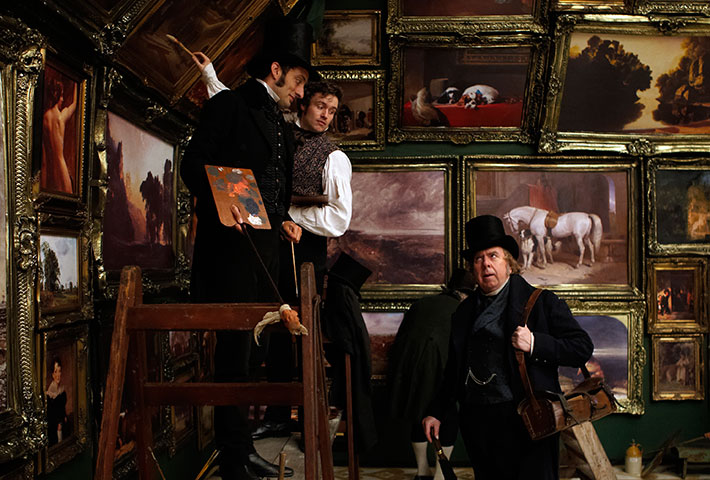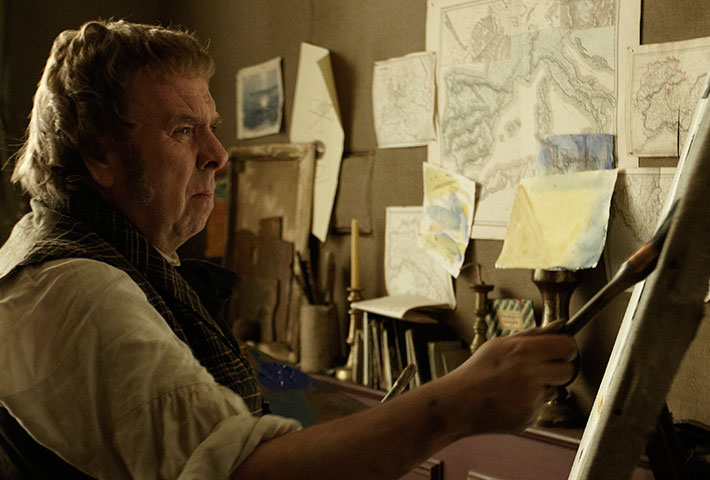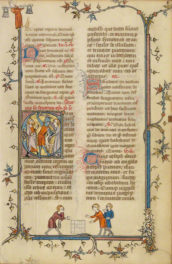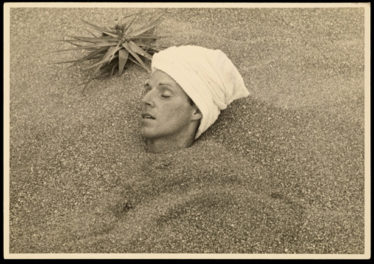
Timothy Spall as J. M. W. Turner. Photo by Simon Mein, Courtesy of Sony Pictures Classics
In Mike Leigh’s new film Mr. Turner, British actor Timothy Spall plays British landscape painter J. M. W. Turner in his final years—the period covered by the exhibition J. M. W. Turner: Painting Set Free coming to the Getty Center in February. As played by Spall, Turner is a gruff, curious man, who approaches a canvas the way an infant approaches a plate of food. He stabs the paint on with his brush, spits at the splotches to dilute them, and then uses his fingers to smear everything to his liking. He’s a hands-on artist.
A Hands-On Filmmaker
As a director, Mike Leigh is a hands-on artist too, but in ways very different from his Mr. Turner. When the British filmmaker began drawing attention from international audiences in the late 1980s and early 1990s with searing social dramas like Life Is Sweet, High Hopes, Naked, and Secrets & Lies, critics and reporters commented on Leigh’s collaborative process first.
Leigh’s films have been described as “improvised,” but that’s not really accurate. Leigh roughs out a premise and then gathers a trusted group of actors to rehearse and experiment, filling in the broader idea with more specific characters, incidents, and dialogue. Only after the cast has helped Leigh develop and hone the story does he turn on the camera.
Over the years, Leigh has been more interested in contemporary life and everyday working folk than in historical figures like Turner; and he’s very rarely made movies about people involved in the arts. One major exception is 1999’s Topsy-Turvy, a film about how Gilbert and Sullivan recovered from a creative lull to write and stage the comic opera The Mikado. It is a story about a writer and composer who work much like Leigh does, in concert with craftsmen, performers, producers, and family members who all have ideas of their own.
Topsy-Turvy is occasionally about the mysterious forces that shape popular art—including how entertainers can be driven by fears that they’ve run out of ideas or are squandering their talent. Topsy-Turvy shows the laborious effort that went into every note and gesture of The Mikado. But even more than art, Topsy-Turvy is about London in the 1880s, when well-to-do theatergoers were captivated by the latest crazes, from the fountain pen to Japonisme.
Working Up a Sweat
As in Topsy-Turvy, in Mr. Turner Leigh depicts the culture of the art world, this time in the 1830s and 1840s. The film’s best scenes, for example, follow Spall’s Turner into the meetings and exhibitions of the Royal Academy of Arts, where he’s regarded as an at-times disruptive eccentric, shrugging off academics and peers to present the world exactly as he sees it. Mr. Turner is a character piece and a period piece that just happens, almost incidentally, to be a celebration of a great painter.

This has always been Leigh’s way. He makes gripping and at times amusingly digressive melodramas, following scenes wherever his actors care to take them rather than trying to force the material into any particular shape. In the case of Mr. Turner, Spall and company lead Leigh into long stretches that have to do with Turner’s familial and romantic relationships. These have to do with art only tangentially, in that they show how a man of Turner’s standing had the freedom to indulge both his artistic whims and his personal desires.
Yet even though J.M.W. Turner had different working methods than Leigh does, and even though he lived a very different life—in a bygone England, with a very different class system—Mr. Turner is still a personal film for Leigh. To see the director’s hand, don’t look to any of the conversations about painting, but look instead to scene at the start of the film where Turner’s father buys pigments from a local shop, or a later scene where the elder Turner leads customers through his son’s makeshift living-room gallery.
If Leigh identifies with the artists he occasionally makes movies about, it’s because he sees them as fellow tradesmen, working up a sweat as they fashion their ideas and visions into something they can sell. His Mr. Turner is a gentleman by social position, but he’s also a brute laborer, with paint-spattered hands.





Comments on this post are now closed.